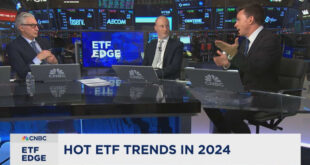Against that backdrop, emerging markets — which Turkey is part of — have become the biggest casualty in the recent market rout.
The iShares MSCI Emerging Markets exchange-traded fund, a passive investment product that tracks the index, has fallen by more than 1 percent this week even though Turkey makes up only 0.6 percent of the underlying assets.
Investors have been pulling money out of the broader emerging markets for fear that other countries, especially those with poor financial positions, will follow in Turkey’s footsteps. Such withdrawals have hurt other currencies: The Indian rupee and Argentine peso touched their weakest levels against the U.S. dollar earlier this week.
But such fears may be unfounded, experts said.
“Turkey’s crisis raises concerns about more fragile emerging-market countries that similarly carry larger current account deficits like Brazil, South Africa, and Argentina,” Wells Fargo Investment Institute said in a Tuesday report.
“It is important to remember that emerging-market countries, on the whole, have much stronger financial positions than they did 20 years ago,” it added.
Despite the limited exposure to Turkey’s financial system, bank stocks in the U.S., Europe and Japan were also hit.
European banks such as Spain’s BBVA and Italy’s UniCredit, which have units in Turkey, this week saw their shares fall by 3.3 percent and 4.6 percent respectively.
Turkish banks are vulnerable in the current situation because companies have accumulated a high level of debt in foreign currencies, which they may find increasingly difficult to pay back given the weak lira. The country’s total borrowing denominated in currencies other than the lira has grown to more than 50 percent of its gross domestic product — and much of that debt is held by companies.
Investors are concerned that weakness within Turkish banks may spill over to foreign lenders that have assets in the country.
“The weak spot in this whole set up is the banking system. I think right now, we’re still in an okay place. If we’re still in the same situation in nine to 12 months, I think the banks here are the weakest link,” Nafez Zouk, lead emerging markets economist at Oxford Economics, told CNBC’s “Capital Connection” on Wednesday.
 EU News Digest Latest News & Updates
EU News Digest Latest News & Updates



